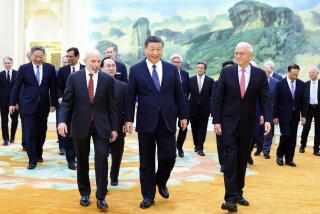Trade at the Top
The meeting in Los Angeles between President Reagan and Prime Minister Yasuhiro Nakasone of Japan did not produce any magic formulas for reducing the huge and growing trade imbalance between the two countries. But, judging by post-summit statements, the Japanese leader goes home with a heightened appreciation of the need for concrete actions to widen the access of U.S. exporters to the Japanese market.
Before the prime minister’s arrival in Los Angeles for his fifth summit meeting with Reagan, the Japanese government was at pains to emphasize that, while trade issues obviously would be discussed, Nakasone expected equal or greater attention to be paid to global political issues.
This was understandable and appropriate. Japan’s economy is the second largest in the free world, a fact that gives Japan worldwide interests. Nakasone personifies Japan’s growing determination to exercise political influence more commensurate with its economic power.
The United States and Japan have common interests and responsibilities. Aside from the importance of U.S.-Japanese trade to the economies of both countries, Japan depends on the United States for its fundamental security and Washington regards Japan as the linchpin of the U.S. political and strategic position in the Pacific.
The prime minister, who sees Japan as a full member of the Western community, was anxious that the summit include discussions of such non-trade topics as East-West relations, arms control, the tensions between North and South Korea and the situation in the Middle East.
These subjects were discussed by Reagan and Nakasone. Inevitably, however, the massive U.S. trade deficit--of which Japan alone accounts for $34 billion--overshadowed all else. Japan has already taken significant steps to open its domestic market to U.S. trade and investment. But Commerce Secretary Malcolm Baldrige echoed a common American complaint when he said Wednesday that, on products where Japanese producers are less efficient than U.S. companies, “they find ways to keep us out.”
As Reagan publicly recognized, the imbalance in trade with Japan is only one cause of the big U.S. trade deficit. But it an important cause, and failure to deal with it almost certainly would produce U.S. protectionist measures that would impair both economic and political relations.
Nakasone sounds like a man who understands the problem and is prepared to act. He gave Reagan reason to believe that measures will be taken to give U.S. exporters a fair shot at the Japanese market in telecommunications, computer software, medical supplies and forest products. He promised that U.S. business will be represented on a Japanese trade advisory panel. And, of great potential importance, he pledged to promote economic policies that will enhance domestic Japanese demand, thereby relieving the compulsion to export.
It is encouraging that the two leaders agreed that aides to Secretary of State George P. Shultz and Foreign Minister Shintaro Abe will have follow-up meetings “to get down to brass tacks” in resolving issues concerning trade. The question now is whether the follow-through lives up to the promise.
More to Read
Inside the business of entertainment
The Wide Shot brings you news, analysis and insights on everything from streaming wars to production — and what it all means for the future.
You may occasionally receive promotional content from the Los Angeles Times.










